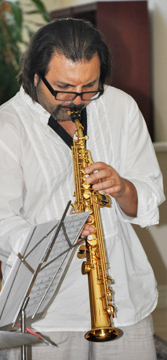به زبان فارسی
PICTORY
LATEST MUSIC
SEARCH
Pop with Style
by Ari Siletz
15-Jul-2011
A major element of success for some Iranian diaspora musicians is nostalgia. The challenge for these artists is how to continuously repackage the sound of the 1970s Iranian pop music without becoming repetitive and boring. Another challenge is how to filter their feelings about the events that have happened since then so that traces of historical reality do not make their romantic and carefree lyrics appear petty. Shahrzad Sepanlou is one of the few singers who has found a way around the problem. While her singing style pays tribute to the Iranian pop classics of decades ago, the soft sounding lyrics typically ignite when mixed with memories of contemporary events. Depending on his mood, the listener can chose to dream, reliving the feelings of long ago, or rise to waking, contemporary emotions.
With this level of sophistication, Sepanlou’s songs can no longer be classified as pop. In fact they don’t quite sound pop because the approach places a heavier burden on the composer than ordinary pop. There will be many places where formula fails, and the composer must have the skill to invent reassuringly so that the easy listener is not too strained by the novelty. I spoke briefly with Sepanlou’s composer and arranger, Farzin Farhadi about the challenges of Sepanlou’s style. [see rehearsals photo essay]
Farhadi believes that the diaspora Iranian music lover has changed attitude over the years, making it easier for Sepanlou’s refined style to gain a concert audience. Years ago, only Persian classical artists could ask an audience to sit still in a concert and carefully listen. More popular music played in large gatherings was typically interpreted as dance music, whether it was performed at a wedding or in a theater. Over time, the Shajarain and Alizadeh concerts performed abroad grew the audience accustomed to concert listening in the context of any polished music, classical or otherwise. So now it is possible for a composer to step beyond formulas and develop refined non-traditional music
Farhadi studied music at Boston’s Berklee College of Music, a school that primarily trains for jazz, rock and popular music. He is also a master jazz instrumentalist trained in the Western musical tradition. Farhadi is often sought by diaspora musicians because he also has a strong feel for the preferences of the Iranian ear. This way he brings the vast improvisational toolkit of jazz theory to bear on melodies influenced by his Iranian background. I brought up the idea with him that our best singers in the past were surrounded by our top music masters, and perhaps it was they who created the singer’s style for her. Farhadi neither agreed not disagreed, but added that part of a singer’s talent is recognizing which artists to hang out with and be influenced by. Sepanlou is not only a voice talent, but also gifted in choosing her composers, instrumentalists and lyricists.
[see rehearsals photo essay]
Farhadi will perform with Shahrzad Sepanlou at Yoshis in San Francisco Sunday July 17, 2011.
| Recently by Ari Siletz | Comments | Date |
|---|---|---|
چرا مصدق آسوده نمی خوابد. | 8 | Aug 17, 2012 |
| This blog makes me a plagarist | 2 | Aug 16, 2012 |
| Double standards outside the boxing ring | 6 | Aug 12, 2012 |
RECENT COMMENTS
IRANIANS OF THE DAY
| Person | About | Day |
|---|---|---|
| نسرین ستوده: زندانی روز | Dec 04 | |
| Saeed Malekpour: Prisoner of the day | Lawyer says death sentence suspended | Dec 03 |
| Majid Tavakoli: Prisoner of the day | Iterview with mother | Dec 02 |
| احسان نراقی: جامعه شناس و نویسنده ۱۳۰۵-۱۳۹۱ | Dec 02 | |
| Nasrin Sotoudeh: Prisoner of the day | 46 days on hunger strike | Dec 01 |
| Nasrin Sotoudeh: Graffiti | In Barcelona | Nov 30 |
| گوهر عشقی: مادر ستار بهشتی | Nov 30 | |
| Abdollah Momeni: Prisoner of the day | Activist denied leave and family visits for 1.5 years | Nov 30 |
| محمد کلالی: یکی از حمله کنندگان به سفارت ایران در برلین | Nov 29 | |
| Habibollah Golparipour: Prisoner of the day | Kurdish Activist on Death Row | Nov 28 |




Excellent review
by Multiple Personality Disorder on Sat Jul 16, 2011 08:00 AM PDTI will be very interesting to watch them perform on Sunday.
Thank you Ari,
...
by Red Wine on Fri Jul 15, 2011 05:16 PM PDTThank you Ari jan .